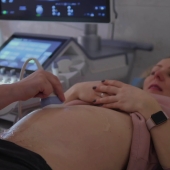Preeclampsia is a pregnancy-related, multisystem disorder characterized by new onset hypertension and proteinuria that can lead to preterm birth and can result in serious maternal, fetal, and neonatal complications, including the death of the mother or the baby.
Professional organizations recommend low dose aspirin in women who are considered to be at high risk for preeclampsia. But randomized trials have demonstrated inconsistent effects of aspirin on the risk of preeclampsia. And strategies for identifying “high risk” women may fail to identify many women who subsequently have preeclampsia.
Combined multimarker screening using a combination of maternal factors. such as age, race, medical history, and biophysical and biochemical measurements between 11 and 13 weeks of gestation has been proposed to improve the detection of high risk cases.
In the international, double-blind ASPRE trial, investigators randomized 1776 women with singleton pregnancies who were identified as being at high risk for preeclampsia on the basis of multimarker screening to receive 150mg of aspirin or placebo daily from 11 to 14 weeks of gestation until 36 weeks of gestation.
The primary outcome, which was delivery with preeclampsia before 37 weeks of gestation, occurred in 1.6% of the women in the aspirin group as compared with 4.3% of those in the placebo group, a statistically significant difference.
Rates of neonatal adverse outcomes did not differ significantly between the aspirin and placebo groups.The authors conclude that low-dose aspirin in women at high risk for preterm preeclampsia reduced the incidence of the condition.
- 71 views













